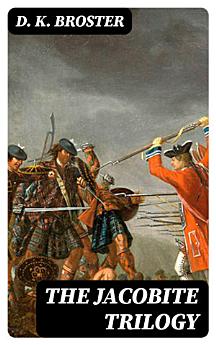The Jacobite Trilogy: The Flight of the Heron, The Gleam in the North & The Dark Mile
D. K. Broster
May 2022 · DigiCat
Ebook
905
Pages
family_home
Eligible
info
reportRatings and reviews aren’t verified Learn More
About this ebook
D. K. Broster's "The Jacobite Trilogy" is a captivating historical narrative set against the backdrop of the Jacobite uprisings in 18th century Britain. The trilogy artfully intertwines rich character development with evocative descriptions of the Scottish landscape, while employing a lyrical, almost poetic prose style that immerses readers in the tumultuous era. Broster delves into themes of loyalty, honor, and the profound consequences of political rivalry, all while weaving intricate plots that bring to life the personal and national struggles faced during this pivotal moment in history. D. K. Broster, a noted Scottish author of the early 20th century, possessed a deep interest in her homeland's history, particularly the romantic and tragic tales of the Jacobite cause. Her own lineage and experiences living in Scotland undoubtedly informed her understanding of the rich cultural fabric that characterized this period, allowing her to skillfully reconstruct the zeitgeist of a nation in turmoil. Broster's literary credentials, combined with her historical passion, lend authenticity and depth to her narratives. Readers with an interest in historical fiction or Scottish history will find "The Jacobite Trilogy" an essential addition to their library. Broster's masterful storytelling, complemented by her insightful exploration of this era, provides not only a thrilling read but also a profound understanding of the human experiences behind the historical events. This trilogy stands as a testament to the resilience of the human spirit and the enduring nature of hope amidst struggle.
About the author
Dorothy Kathleen Broster, commonly known as D. K. Broster (1877 – 1950), was a British author most notably recognized for her historical novels set in the highlands of Scotland. Born in Liverpool, Broster served as a Red Cross nurse during World War I, an experience that would add a layer of depth to her characterizations and themes of conflict and camaraderie within her literary works. After the war, she pursued writing full-time, drawing upon history for inspiration. Broster's literary style is characterized by a keen attention to historical detail and a flair for dramatic narratives. Her most celebrated work, 'The Jacobite Trilogy', comprising 'The Flight of the Heron' (1925), 'The Gleam in the North' (1927), and 'The Dark Mile' (1929), delves into the 1745 Jacobite uprising with vivid characterizations and a strong sense of place, which earned her a dedicated following. Broster's depiction of the ill-fated Jacobite cause and her exploration of loyalty and honor have cemented her status as an important figure in historical fiction. Though her literary output was not prolific, her works continue to be praised for their historical accuracy and narrative power, affording her a respected place in the pantheon of early 20th-century English literature.
Rate this ebook
Tell us what you think.
Reading information
Smartphones and tablets
Install the Google Play Books app for Android and iPad/iPhone. It syncs automatically with your account and allows you to read online or offline wherever you are.
Laptops and computers
You can listen to audiobooks purchased on Google Play using your computer's web browser.
eReaders and other devices
To read on e-ink devices like Kobo eReaders, you'll need to download a file and transfer it to your device. Follow the detailed Help Center instructions to transfer the files to supported eReaders.






